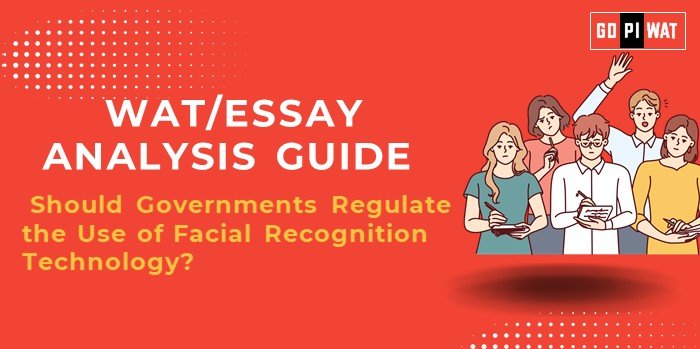📋 Written Ability Test (WAT)/Essay Analysis Guide
📸 Topic: Should Governments Regulate the Use of Facial Recognition Technology?
🌐 Understanding the Topic
Facial recognition technology (FRT) is transforming industries by offering enhanced security and convenience. However, its potential misuse raises significant ethical concerns, including privacy violations, systemic bias, and data breaches. Governments worldwide are increasingly being urged to regulate its use to balance innovation with societal ethics and security.
⏳ Effective Planning and Writing
- Time Allocation:
- 🕒 Planning: 5 minutes
- 📝 Writing: 20 minutes
- 🔍 Review: 5 minutes
- Structure:
- 💡 Introduction: ~60 words
- 📜 Body: ~350 words
- ✔️ Conclusion: ~70 words
💡 Introduction Techniques for Essays
- ⚖️ Contrast: “While FRT offers unprecedented convenience, its unchecked use raises serious ethical and security concerns.”
- 🌍 Global Context: “As the EU drafts stringent FRT regulations, countries like India rapidly expand its adoption, highlighting the global divide in governance.”
- 🛠️ Problem-Solution: “The growing FRT market necessitates regulatory frameworks to address biases, cybersecurity, and privacy risks.”
📊 Structuring the Essay Body
- 🎯 Achievements: Cite examples like Digi Yatra enhancing airport efficiency and FRT aiding law enforcement in solving crimes.
- 🚨 Challenges: Highlight issues like systemic bias (e.g., racial discrimination), privacy violations, and data breaches.
- 🔮 Future Outlook: Advocate for international standards, robust cybersecurity, and public awareness campaigns to ensure FRT’s ethical use.
🤝 Analyzing Successes and Shortcomings
- 🏆 Key Achievements: Streamlined operations, law enforcement support, economic contributions.
- ⚠️ Ongoing Challenges: Privacy concerns, systemic biases, risks of data misuse.
- 🌍 Global Context: Compare the EU’s Artificial Intelligence Act emphasizing ethics versus China’s widespread surveillance system.
🌍 Recommendations for Sustainable Progress
- ✔️ Develop robust regulatory frameworks addressing bias and privacy.
- 🔒 Implement stringent cybersecurity measures for data protection.
- 📣 Foster public awareness about FRT’s implications and citizen rights.
📄 Sample Short Essays
- ⚖️ Balanced Perspective: “FRT’s potential is undeniable, but its misuse threatens privacy and equity. Governments must regulate its use, ensuring innovation does not compromise ethics and security.”
- 🔧 Solution-Oriented: “Governments must regulate FRT with policies addressing systemic biases, privacy rights, and cybersecurity. Collaboration with industry stakeholders will ensure equitable implementation.”
- 🌐 Global Comparison: “While the EU emphasizes ethical FRT deployment through stringent rules, India’s rapid adoption highlights the urgency for robust governance. Balancing innovation with regulation is the way forward.”


